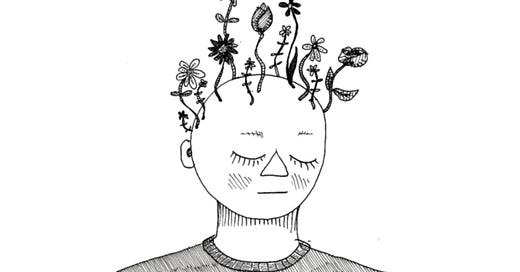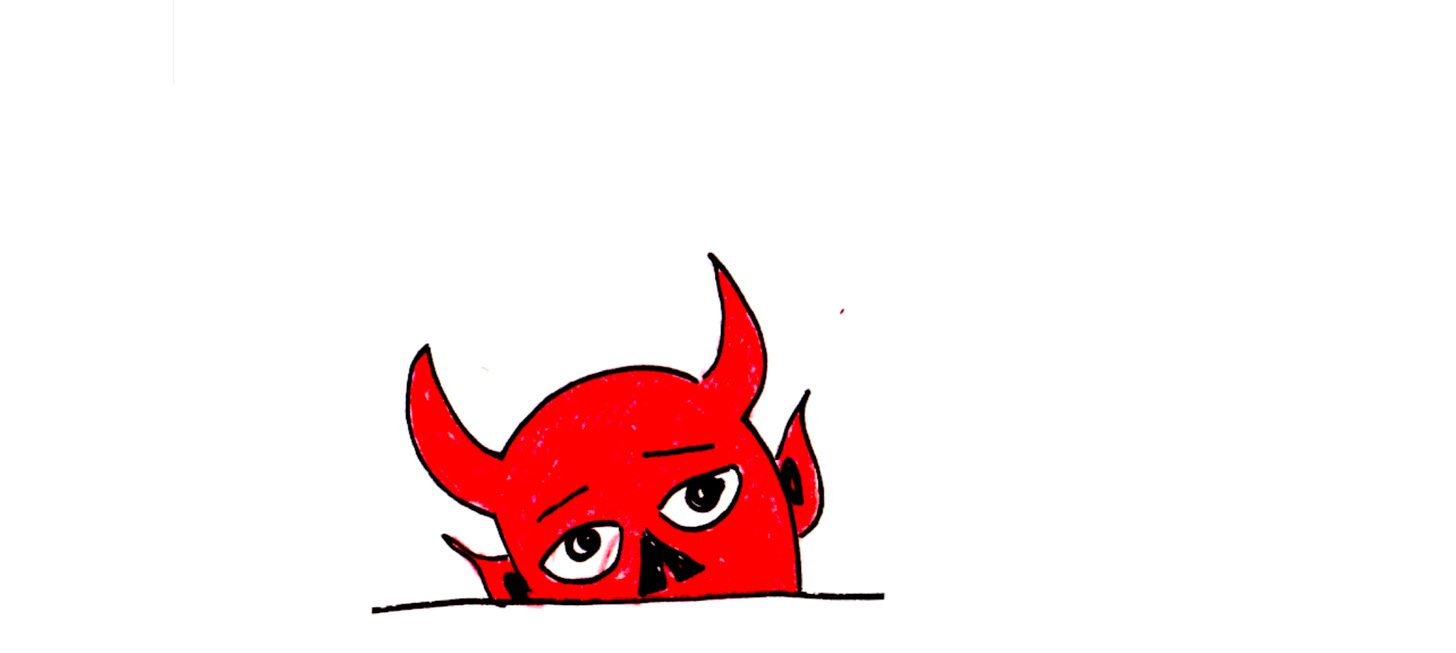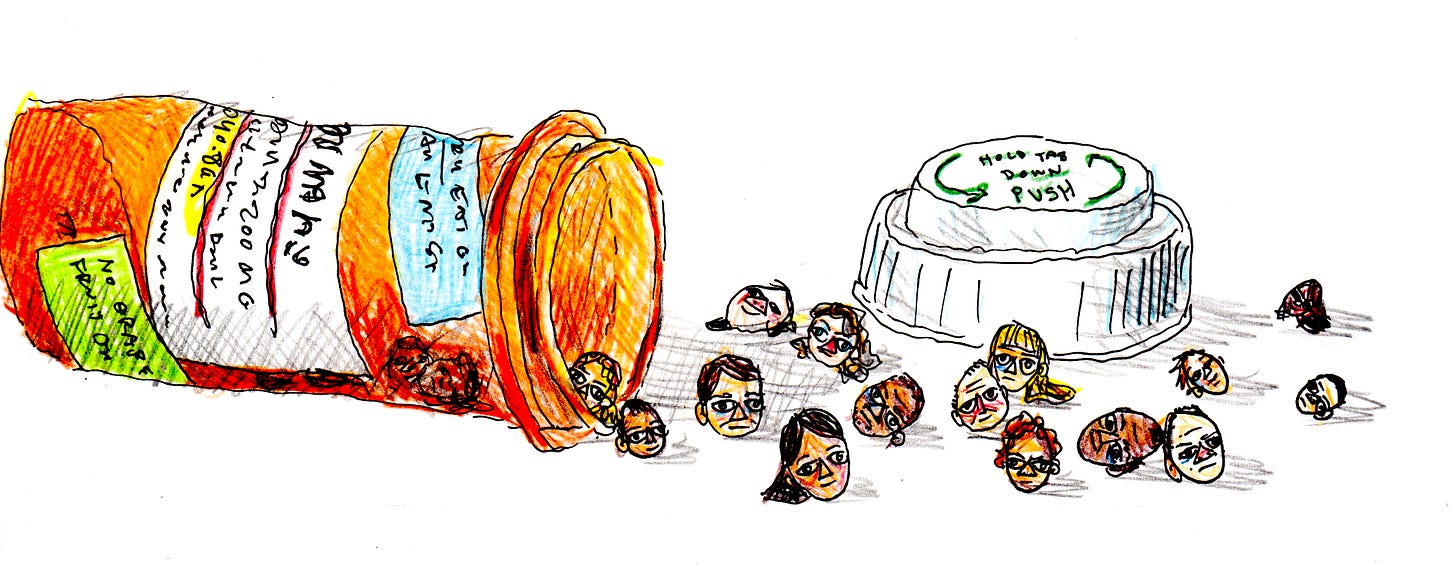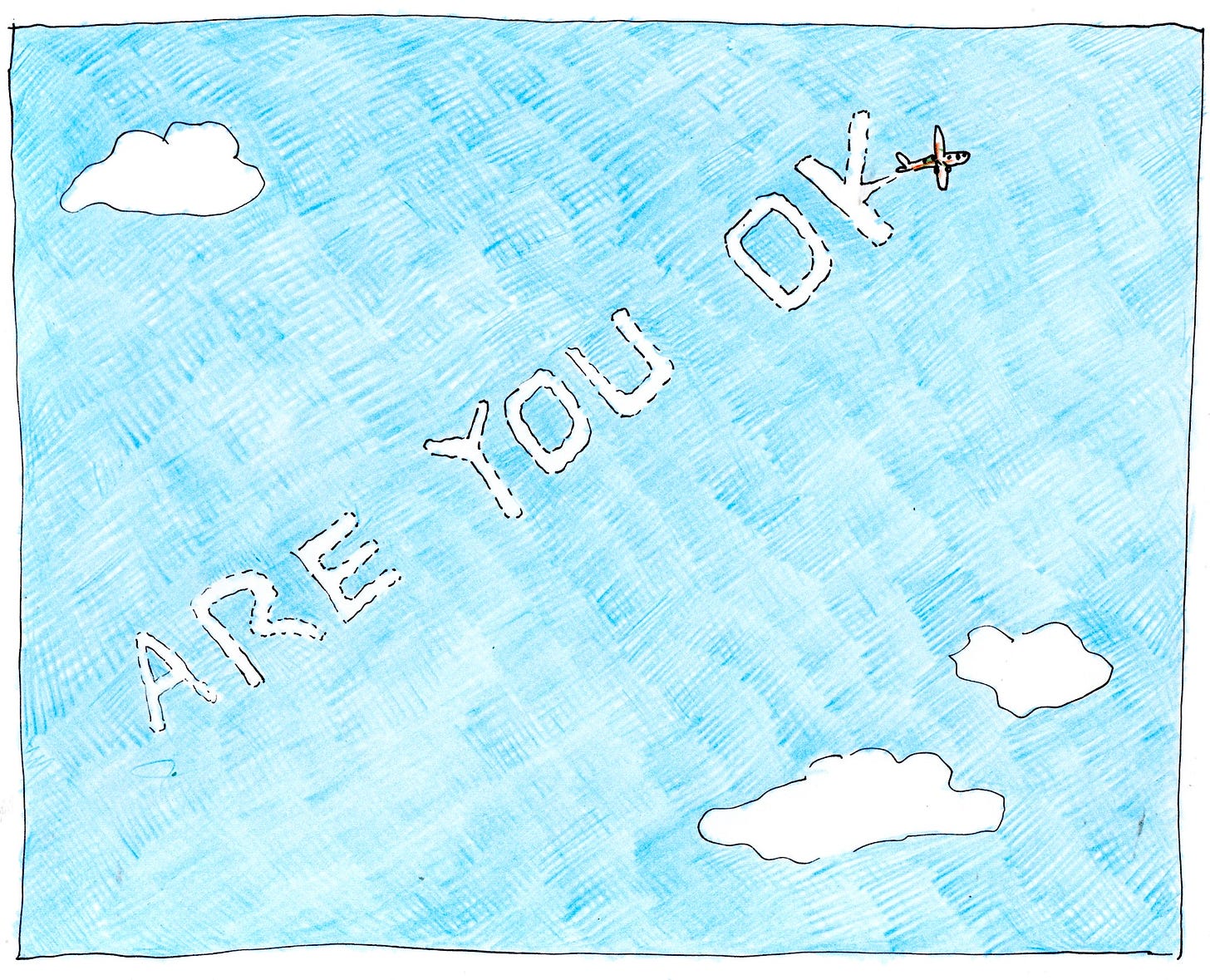Thousands of med-taking manic-depressives read The Small Bow, and it’s been such a lovely surprise to connect with them here. I’m a lucky success story and my meds have eliminated most of my scary-dark episodes: No self has been harmed for a few years now.
But some people who are fighting through treatment-resistant depression can’t find any meds that work for them. And walking around with TRD has been described to me as “death without dying” by a few people.
Some of our readers have stepped up and shared their stories about their experiences with assisted ketamine sessions, and some of the results are stunning. I’m still compiling all the entries and will run those on Friday. Today, I’m republishing an essay from 2019, written by journalist Katie MacBride, about her quest for relief from suicidal depression and the many ways it challenged her sobriety. She’d stopped drinking alcohol for good—but did trying non-AA-approved recovery methods (like ketamine) mean she wasn’t really sober?
“Sobriety might traditionally be defined as the absence of alcohol, but my recovery is much more complex: It’s the process of trying to loosen the knot of pain and self-loathing that fueled my addiction and still fuels my depression.”
Katie’s piece was named a “Best American Essays” 2020 Notable essay, and it was one of TSB’s first big breakouts. We’d love to put more of these stories out into the world, and the best way you can help us do that is by becoming a paid subscriber. We’re doing good work here—thank you so much for supporting TSB! — xx AJD
But the Drugs Keep Me Sober
Sometimes when my boyfriend texts me to tell me he’s on his way home from work, I type back, “my legs are broken.” I don’t know why I insist on this code when we both know what it means. It’s embarrassing to be so plagued by my thoughts, especially because I’m 11 years sober. I’m supposed to be out of my own head, serviceable to others, and placatingly serene. Instead, I get a voice that says, “You are a useless piece of shit.” It might just be a symptom of depression, but it never feels like it. It always feels like the truth.
I’ve been on some kind of antidepressant since the day after my last drink—and my first day in the psych ward. I had been rolled into the ER by a concerned coworker who found me passed out in front of my cubicle with my coat on and purse over my shoulder. My blood alcohol was .4 and I had a suicide note and boxcutter in my purse. That was more than enough to have me committed and begin my anti-depression regimen.
Since then, there’s been no more alcohol and no more suicide notes,, so the pills work on one level. But recently, in the past few years, the Effexor, Prozac, and Lexapro haven’t been working as well. So I did what the recovery community tells you not to do: I took mind-altering drugs.
The first time I heard about ketamine (“Special K”), I was in high school. A friend who did more drugs than I did (I was always a drinker over anything else) was talking about going to a rave and taking it with acid. I took it in a psychiatrist’s office as part of a Ketamine Assisted Therapy program for treatment-resistant depression. I told very few people I was trying this, knowing for many people in recovery, it would be a mind-altering step taken too far. It wasn’t as successful as I’d hoped.
The psychiatrist had warned me that some people can’t tolerate ketamine, that it makes some so nauseous they heave it all up before it has much of a chance to do anything therapeutic. That was indeed the case with me. Instead of having a medicinally mind-altering experience, I vomited repeatedly while the psychiatrist handed me barf bags and took notes on his clipboard. But if it had worked, if it had alleviated my depression the way it has with other people, I’d do it again.
*****
Cannabis products (mostly high CBD/low THC) help with my migraines and insomnia. I’ve used them for years despite knowing some people end up with a cannabis addiction, and even though as a teenager, I used marijuana recreationally. There’s minimal psychoactive effect with the products I use; however, at most, they make me sleepy (which is usually the goal). But still, I have crossed the line of “mind-altering drugs,” that hard and fast rule to which most people in recovery steadfastly adhere.
I can’t get away from the nagging insecurity, the cold, itchy guilt that I’m not really in recovery anymore, or sober enough, if I’m not sticking to the rules by which they’ve decided to play.
Intellectually, I know this isn’t true. Recovery is not about the chemicals running through my bloodstream. Recovery is individual and personal. For me, it’s also inextricably linked to my depression. So, while sobriety might traditionally be defined as the absence of alcohol, my recovery is much more complex: It’s the process of trying to loosen the knot of pain and self-loathing that fueled my addiction and still fuels my depression.
It’s the work of finding new doctors, new treatments, and developing new habits so the pain becomes slightly more bearable and my self becomes less loathing.
I’ve been texting my boyfriend about my broken legs a lot lately, so I made an appointment with a new psychiatrist, the first one I’ve seen since the guy whose office I barfed in. We sit in his very beige office, and he asks me when my depression started. I tell him I’ve been on antidepressants for 11 years.
He reviews my intake forms and knows I’m sober, the medications I’ve been on, and the therapies I’ve tried. Immediately when we sit down, he congratulates me on my sobriety, and I feel my face get warm. Needing to be here over a decade after quitting alcohol, the substance that comprised a significant part of that knot of self-loathing does not feel like much of an accomplishment, but I thank him anyway.
“Forget how long you’ve been on antidepressants, though,” he says. “How long have you been depressed?” I say “forever,” not wanting to sound flip, but it’s the truth.
He tells me that a brain like mine will always require some kind of antidepressant. “That’s not true for everyone,” he says, “but it is for you.” So many depressive episodes over so many years mean there’s something wrong with my brain, something that sobriety alone can’t fix. And this is the thing he says feels the truest. If alcohol were my only problem, abstinence would be a simple and complete solution.
I’ve researched and written a lot about addiction, and I know it’s not entirely binary, that “our relationship to substances sometimes exists on a spectrum that can change over time,” but my alcohol addiction was pretty damn binary. I never drank in moderation; one drop of alcohol and I’d lose control, unable to stop drinking until passing out forced me to. There’s a reassuring simplicity in knowing that whatever happens after I drink will be very, very bad.
The psychiatrist asks me to list the various antidepressant cocktails I’ve been on, and I do. I watch his eyebrows furrow and mouth twitch as he silently evaluates the treatment regimens prescribed by my general practitioner. When I get to the part about using high CBD/low THC cannabis products for insomnia and migraines, he stops me. He’s read about this on my intake forms, and seems excited about it, but not in a good way.
He stands up from the armchair and walks over to his desk, where he prints out an article about the dangers of cannabis for people with mood or deeper psychiatric disorders. “It can make you schizophrenic, you know.”
My research suggests otherwise, especially for non-psychoactive CBD-dominant products. But I don’t say anything. An hour before I came here, an article appeared in my newsfeed about the over-reliance of psychiatry on antidepressants; the author argued that most antidepressants work no better than placebos and are simply “expensive Tic-Tacs.” Maybe there is truth to both of these assertions, and maybe there is none. Right now, I don’t feel I have the luxury of caring. Right now, I will try anything short of unscrewing a bottle I won’t buy.
*****
I used to write an advice column about recovery, and I would tell people repeatedly that you do whatever works. What works for one person might not work for you, but if you find the thing that does, grab it and hang on to it tight until it doesn’t work anymore. As long as there’s credible science behind it (and relative safety), I’ll do the same for my depression.
Despite my nagging insecurity about what anyone in the long-established recovery community thinks, I know that I am sober as long as I am not drinking. Alcohol uncorked a full-throttle addiction: I could not and would not stop drinking, even knowing it would kill me, not caring as long as I could keep on with it. My hands shook without alcohol; the demon liquid, ironically, felt more necessary than air or water.
I’ve never encountered anything that had so much power over me. But if certain folks in the recovery community are correct and sobriety is this big all-or-nothing thing where any drug that might balance my brain is verboten, or I’m not sober, I might as well drink. If working with a doctor to find a chemical that might help lift me out of the claustrophobic terror of my mind is the same thing as waking up every morning and unscrewing the cap on a vodka bottle before I’ve even gotten out of bed, what incentive do I have not to go back to the substance I loved so much that I didn’t care if it killed me?
As should be clear by now, sobriety alone doesn’t fix me. Trying to stay sober, trying to find a way out of my depression, working with a therapist, being of service to other people struggling to get sober, being open and honest about my mental illness, all of that together is the work of recovery. And that work is complex and ongoing and forever imperfect.
The psychiatrist tells me aerobic exercise is the only kind that will make a difference. I know this. Instead of mindlessly scrolling through Twitter, I should go for a run. He doesn’t seem to realize that I have two broken legs and he’s suggesting I dance.
Nevertheless, I promise myself that I will take the dog on longer walks and that I will walk to the grocery store instead of driving. Even though I’ve stopped drinking, I will not give up on the work of recovery, for I know what happens when I give up. The suicide note they found in my wallet 11 years ago wasn’t written because I had a plan to kill myself; it was “just in case” I decided to. I hadn’t made an active decision; I had simply given up trying to live.
A few months ago, I found a great therapist. Recently, she mentioned that one of the connotations of the word sober is “clear-eyed,” able to assess the world as it is. Without alcohol, yes, but without the chorus of you’re a piece of shit running through my brain, too. In the latter sense, I’m not yet sober. But maybe the drugs will help me get there.
*****
Katie MacBride is a writer whose work has appeared in Rolling Stone, The Daily Beast, Vice, and Longreads, among other publications. Read more of her work here.
This is The Small Bow newsletter. It is mostly written and edited by A.J. Daulerio. And Edith Zimmerman always illustrates it. We need your support to keep going and growing.
We send it out every Tuesday and Friday morning. You can also get a Sunday issue for $5 a month or $45 per year.
If you already have too many newsletters in your inbox but would still like to help our publication succeed, you can make a one-time or monthly donation by pressing this button.
Or if you like someone in or out of recovery an awful lot, you can buy them a subscription.
END NOTE:
“Let us stifle under mud at the pond’s edge and affirm that it is fitting and delicious to lose everything.” — Donald Hall
ALL ILLUSTRATIONS BY EDITH ZIMMERMAN








Such a lovely piece, AJ. Thank you for sharing this again.
Sober 43 years. Can’t eat just one doughnut. I recently tried nicotine lozenges to help appetite suppression. Just kicked it after 6 months. Trigger warning: unsolicited advice to follow.
Go somewhere barfproof. My program: The Program, swim, meditation and stop trying to avoid feeling bad. Not doing things like this is akin to not wiping my ass.